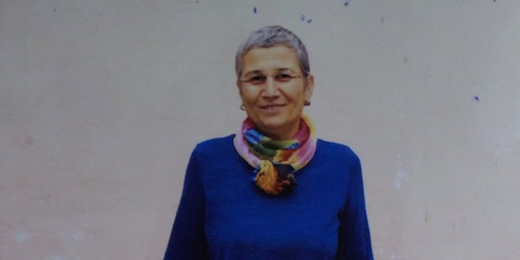Washington Kurdish Institute
March 14, 2019
Leyla Guven, co-chair of the Democratic Society Congress (DTK) and a democratically-elected Kurdish member of the parliament of Turkey from the Peoples’ Democratic Party (HDP), was imprisoned on January 22, 2018 for her criticism of the Turkish state’s policies, including the Turkish military campaign of aggression against the people of Afrin, Syria. After months of imprisonment, Guven began a hunger strike on 8 November 2018. She stated that she would continue her hunger strike until the isolation imposed upon imprisoned Kurdish leader Abdullah Ocalan, the founder of the Kurdistan Workers’ Party (PKK), is ended. Since she initiated her hunger strike, hundreds of prisoners within Turkey and activists worldwide have joined her in undertaking this action. In addition to the hunger strike actions undertaken in Turkey and northern Kurdistan, this protest has spread to southern (Iraqi) Kurdistan, France, Wales, Germany, Austria, the Netherlands, and Canada, and solidarity demonstrations have taken place worldwide, from northern Europe to South Africa. At this point, Guven’s hunger strike has lasted over 125 days, that of HDP Southern Kurdistan Representative in Hewler (Erbil) Nasir Yagiz has exceeded 110 days, and a group of Kurdish politicians and activists in Strasbourg, France have been on hunger strike for over 85 days.
Ocalan has been held on the prison island of Imrali since 1999. He has not been allowed to meet with his lawyers since mid-2011, and, from 2015 onwards, he has received only two visits from family. The hunger strikers are drawing attention to the ongoing inhumane treatment of Ocalan and to his importance in finding a solution to the Kurdish question in Turkey and beyond the country’s borders. From 2013 to 2015, the Turkish government and the Kurdistan Workers’ Party (PKK) engaged in direct dialogue concerning the Kurdish question in Turkey. This process was in part facilitated by democratically-elected Kurdish politicians in Turkey as well as others, and it acknowledged the role of Ocalan as an important and essential representative of the Kurdish people, as he was central to this process. At the outset of the dialogue process, Ocalan issued message on Newroz day (March 21) in 2013 calling for a new era of peaceful dialogue, stating, “We have come to a point where we say, ‘Let arms be silenced, and ideas and politics speak’… I, myself, am declaring before millions of witnesses that now a new era is upon us, an era not with arms, but with politics moving forward.” In demanding an end to the isolation imposed upon Ocalan, the hunger strikers are also demanding an end to the ongoing violence plaguing Turkey and northern Kurdistan, and an end to the refusal by the Turkish authorities to peacefully engage with the Kurdish people to find a just solution to the Kurdish question.
Seemingly in response to the hunger strikes, the Turkish authorities granted Ocalan a 15 minute visit from his brother for the first time in more than two years on January 12 of this year, and this meeting occurred outside of regular visitation procedures. The hunger strikers stated that this short visit does not signify a breakthrough in the total isolation imposed upon Ocalan, and have continued with their protest action aimed at securing Ocalan’s living and working conditions. Turkey has taken no further actions to address the demands of the hunger strikers, and just last month, once again rejected his lawyer’s appeal to visit their client. Indeed, the Turkish authorities have sought to stifle the protest rather than address their concerns. A number of hunger strikers have been detained, and prisoners on hunger strike in Turkey have reportedly been denied vitamin B and other essential nutrients which are taken by hunger strikers to decrease the chance of permanent disability if the strike ends. Cleaning materials have been kept from prisoners on hunger strike, as the Turkish authorities seem intent on not only ignoring the demands of the hunger strikers but also exacerbating their conditions. Some prisoners on hunger strike have even been placed in solitary confinement – placed in isolation for protesting the ongoing isolation of Ocalan.
The HDP and Kurdish activists worldwide are attempting to draw the world’s attention to the ongoing hunger strike action and the brutality perpetrated by the Turkish authorities, though the international press has remained relatively uninterested. In the conclusion of her statement issued on March 7, HDP Spokesperson for their Human Rights and Legal Procedures Commission Ayse Acar Basaran, who is also a member of parliament representing the Batman province, stated, “The current picture shows that hunger strikes will spread, and irreversible damages will occur until the isolation against Mr. Abdullah Öcalan held in İmralı Island Prison, is lifted. If this grave picture is not seen by the ruling authorities immediately, it is inevitable that the faith in co-existence and the hope of lasting peace will be damaged.”

